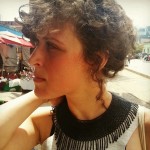I Dream CALLER: [redacted] And She Tells Me
Of the doors
In groves.
How her hands were a stead of
Fragrance, a coveted
Landscape of maple,
Nonetheless.
How before her shadow,
Before these giant
Conifers hid
Like quaking feathers,
She was
Of either.
And so she said:
House of fir
And chlorinates,
Country of steel,
Each dwelling
Is a buckthorn spine.
See my fibrous
Home; My conifers?
How giant.
Of either we
Would die, she
Told me.
And sure
Enough, it was all
About the stream,
Deadwood
And steel. For
To come this way,
She went there
Many, until
The colony of horsehair,
Warehouse of timbre, a
Bristling stock-house
Of grain.
Clear on the one
Side of herself––
And alone––she also stood
On the other.
Until the pillars of her city
Billowed back
To sleep, to every
Once golden peak.
9:20:00 AM, 9-1-1, CRO: Okay, I want you to go on the floor. Kneel on the floor. / CALLER: [redacted]
Every object is the mirror of all others.
Maurice Merleau-Ponty¸ Phenomenology and Perception
In the kingdom was the other.
At the kingdom’s edge was another
kingdom. Every day, noon walked
to the edge of the kingdom’s shore and locked
itself like a stitch in field of grass.
The sky was a mirror of beveled glass,
the ground, a body of arrowgrass thorns.
The kingdom was the mirror,
the mirror, every arrowgrass thorn:
the body’s body—the form.
And the kingdom became the rockrose croon,
a burgeoning bloom.
The other was the kingdom’s home,
river, wood, and scree stone grown.
Every object is the mirror of all others.
Maurice Merleau-Ponty¸ Phenomenology and Perception
In the kingdom was the other.
At the kingdom’s edge was another
kingdom. Every day, noon walked
to the edge of the kingdom’s shore and locked
itself like a stitch in field of grass.
The sky was a mirror of beveled glass,
the ground, a body of arrowgrass thorns.
The kingdom was the mirror,
the mirror, every arrowgrass thorn:
the body’s body—the form.
Both poems (and the larger constellation of poems they are a part of) work with language from September 11th––text from 911 tapes, audio recordings from fire dispatch trucks. I wanted to resurrect archival speech from the deceased, to lay bare the redacted and surveilled text that makes these archives unique. I became obsessed with what the archive wouldn’t let me see, and so I imagined the afterlives of the nameless and redacted callers who collapsed along with the towers. I hope that the poems will act as prayers for the dead, but also as a critique of nationalism.
These poems also try to speak to the interface between national and ecological violence. The way trauma in one scene of life collapses into another. How a cloudless, blue New York sky conjures up the collapse of two skyscrapers, the phantom pillars of a kingdom. How that same blue sky means it’s drone weather in Afghanistan and that children should play inside for the day. Throughout my work with these poems, I was reminded of both the affective qualities of the natural world––the trauma of the bluest sky––and how unflinching the natural can be; how little regard it has for human atrocity.
 Sara J. Grossman has been awarded fellowships from The MacDowell Colony, Hedgebrook, and Virginia Center for the Creative Arts. Her poems and essays have been published in The Cincinnati Review, Guernica, Memorious, Louisville Review, Michigan Quarterly Review and elsewhere. She lives in New York City.
Sara J. Grossman has been awarded fellowships from The MacDowell Colony, Hedgebrook, and Virginia Center for the Creative Arts. Her poems and essays have been published in The Cincinnati Review, Guernica, Memorious, Louisville Review, Michigan Quarterly Review and elsewhere. She lives in New York City.